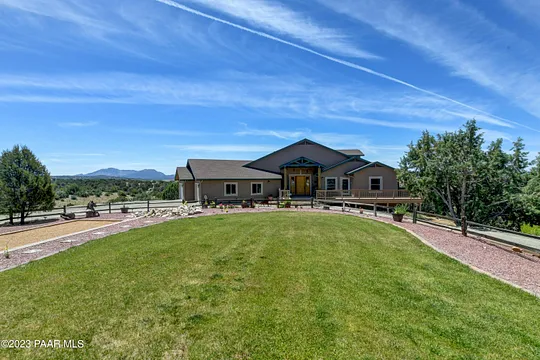In the picturesque city of Prescott, AZ, life’s pace is refreshing, and the landscapes are breathtaking. Here, the dream of owning a farm, tending to crops, and immersing oneself in the tranquility of rural living is not far-fetched.

Buying a farm in this vibrant community brings you closer to nature and gives you the unique opportunity to contribute to the agricultural industry. More than just a real estate transaction, the search for farms for sale in Prescott, AZ is a quest for a fulfilling lifestyle.
Whether you’re drawn to the promise of self-sufficiency, the prospect of sustainable living, or the potential for profitable farming, Prescott, AZ, has a lot to offer. This guide provides a comprehensive overview of the farming real estate landscape in the area, to help you navigate your way to your perfect piece of rural paradise.
The Real Estate Landscape in Prescott, AZ
Prescott, AZ, is more than just a haven for farming enthusiasts. It is a robust real estate market characterized by a mix of residential, commercial, and agricultural properties.
The steady population growth coupled with the city’s commitment to retaining its historic charm and natural beauty makes the real estate scene in Prescott a dynamic one.
Farm properties are a significant part of this landscape, providing both seasoned farmers and enthusiastic beginners with a range of opportunities.
From vast acres of arable land to more modest, hobby-sized farms, the market caters to various farming interests and investment capacities. While the city’s farm properties are scattered throughout its boundaries, they all benefit from Prescott’s distinctive climate and fertile soil.
Why Choose Prescott, AZ for Your Farming Venture
Prescott’s unique climate is a key factor in its appeal to farmers. With over 300 days of sunshine each year and four distinct seasons, this locale allows for a diverse range of crops and farming activities. The city’s natural resources, coupled with a commitment to sustainable farming practices, provide a nurturing environment for both conventional and organic farming operations.
Prescott is also home to a vibrant community of farmers, many of whom have thriving businesses selling their produce locally. Farmers’ markets, food festivals, and farm-to-table initiatives are commonplace, offering a supportive network for new and established farmers. Additionally, the city’s approach to preserving its natural environment promotes a healthy ecosystem that supports sustainable agriculture.
The Financial Aspects of Buying a Farm in Prescott, AZ
Farm properties in Prescott, AZ, are as diverse in their pricing as they are in their offerings. Factors such as location, size, existing infrastructure, and potential for productivity all contribute to the cost of a farm property.

While you can find farms for sale at various price points, it is crucial to consider these factors against your budget and long-term financial goals.
The costs associated with owning a farm extend beyond the initial purchase price. You’ll also need to factor in expenses like property taxes, insurance, and ongoing maintenance, not to mention the operational costs if you plan to run a working farm. It’s important to fully understand these financial considerations before making a purchase.
Understanding the Different Types of Farms for Sale
Farm properties in Prescott, AZ, cater to a diverse range of farming interests. Whether you’re a seasoned farmer or a newbie to the agricultural scene, understanding the different types of farms for sale can help you make an informed choice.
Traditional Farms: These farms focus on the cultivation of staple crops and livestock rearing. They are typically larger in size and require substantial capital and operational inputs.
Organic Farms: Organic farming is gaining popularity, with a focus on sustainable and eco-friendly farming practices
Organic farms in Prescott, AZ, follow strict guidelines for maintaining soil health and avoiding synthetic pesticides and fertilizers.
Specialty Farms: Specialty farms focus on niche markets, such as vineyards, lavender fields, or orchards. These farms provide an opportunity to cater to unique customer demands and often provide added value through farm tours or agritourism activities.
Hobby Farms: For those who wish to enjoy the rural lifestyle without a large-scale commercial venture, hobby farms provide an excellent opportunity. They are smaller in size, focusing on self-sufficiency or producing goods for local markets.
How to Choose the Right Farm for Your Needs
Choosing the right farm for your needs begins with a clear understanding of your farming goals. Are you looking to cultivate a specific type of crop, or do you wish to raise livestock? Perhaps you want to combine both. Understanding the type of farming operation you wish to run will help narrow down your options.
Next, consider the farm’s potential for profitability. If you plan on turning your farming operation into a business, it’s important to understand the local market demand, crop yield, and operational costs. Consider consulting with a local agricultural extension office or hiring a farming consultant to gain a deeper understanding of these aspects.
The farm’s potential for future expansion is another crucial aspect to consider. If you’re just starting, a smaller farm may suffice, but if you plan on expanding your operation in the future, a larger piece of land might be a better investment.
A Closer Look at the Purchase Process
Buying a farm in Prescott, AZ, involves more than just finding a property you love and making an offer. The process includes a series of steps that require careful consideration and due diligence.
Start with thorough market research to understand the local real estate trends and pricing. Also, make a list of your needs and wants in a farm property. Once you’ve found a property that meets your criteria, you’ll want to investigate further.
This investigation could involve a thorough inspection of the property, discussions with local planning authorities, and consultations with a real estate lawyer.
Legal documentation is an integral part of the purchase process. A written sales contract will outline the terms and conditions of the sale, while title deeds and other legal documents will verify the property’s ownership and any legal encumbrances. A real estate lawyer can guide you through the process, ensuring all paperwork is in order.
Working with a Real Estate Agent

Working with a real estate agent who specializes in farm properties can significantly streamline your property search and purchase process. Such agents have a deep understanding of the local market, the unique aspects of purchasing farm properties, and the potential challenges that may arise.
Choosing the right agent involves considering their experience, reputation, and knowledge of the Prescott, AZ, farm property market. Be sure to interview several agents and ask for references before making your selection.
Financing Your Farm Purchase
Financing a farm property purchase often involves more than just a traditional mortgage. Agricultural loans, grants, and farm credit services are just a few of the options available to prospective farm buyers.
Traditional lenders like banks and credit unions can provide mortgages for farm properties, especially for smaller, residential farms. For larger agricultural ventures, agricultural loans from institutions like the Farm Service Agency (FSA) can provide more tailored financing options.
Grants, often aimed at encouraging sustainable farming practices or supporting beginner farmers, can also be a valuable resource.
Farm Inspection
When considering a farm for purchase, a thorough farm inspection is essential. It’s more than just a quick walk-through of the property. A farm inspection involves a close look at the property’s infrastructure, the condition of the soil, water resources, and potential challenges that could affect your farming operations.
An inspection can help identify potential issues like soil erosion, water drainage problems, or pest infestations. It can also highlight positive aspects such as fertile soil, excellent water resources, or well-maintained buildings and fences.
Negotiating the Purchase
Negotiating the purchase of a farm property requires a good understanding of the local market and the specific property’s value. It’s not just about the asking price; it’s about understanding what the property offers in terms of agricultural potential, existing infrastructure, and future growth opportunities.
Keep in mind that the seller will have their own expectations and needs, and it’s essential to approach negotiations with respect and fairness. Be ready to compromise and, if necessary, walk away if the deal isn’t right for you.
Closing the Deal
The final steps in the farm purchase process involve closing the deal. This step includes finalizing your financing, completing any remaining legal paperwork, and paying the closing costs. Closing costs typically include fees for legal services, title insurance, and property transfer taxes.
Upon closing, you’ll receive the keys to your new farm property, marking the beginning of your exciting farming adventure in Prescott, AZ.
Post-Purchase Considerations
After purchasing your farm, the real work begins. Initial setup can involve tasks ranging from minor repairs and cleaning to more substantial projects like building fences or renovating farm buildings.
Managing a farm also requires considering hiring farm staff, especially for larger operations. You’ll need to think about who will oversee day-to-day operations, whether that’s you or a farm manager. Ongoing maintenance, crop planning, and livestock care are other considerations to keep in mind.
Tips for Success in Your Farming Venture
Success in farming comes from careful planning, hard work, and a deep understanding of the land and its potential. Understanding the local climate and soil conditions, selecting appropriate crops, and employing sustainable farming practices are just a few of the elements that can contribute to a successful farming operation.
Joining local farmer associations or networks can also be beneficial. These organizations offer valuable resources, educational opportunities, and the chance to connect with other farmers in the Prescott area.
Local Stories and Case Studies
To gain a deeper understanding of farming in Prescott, AZ, it’s beneficial to explore local stories and case studies. Many farm owners in the area have shared their experiences, providing insight into the successes and challenges of farming in this region.
Whether it’s a tale of transforming a rundown property into a thriving organic farm or a family’s multi-generational history of farming in Prescott, these stories offer invaluable lessons for aspiring farmers.
Preserving and Growing Your Investment

Owning a farm is not just about running a successful farming operation. It’s also about preserving and growing your investment. Regular maintenance and upgrades to the property, efficient farm management, and investing in soil health are just a few of the ways to enhance your farm’s value over time.
Agritourism Opportunities
Prescott, AZ, with its stunning natural beauty and rich history, offers an excellent opportunity for agritourism. By opening your farm to visitors, you can provide educational experiences, direct sales of farm products, and leisure activities that complement your farming operation.
From pumpkin patches and apple picking to vineyard tours and farm-to-table dinners, there’s a myriad of ways to engage the public while adding a lucrative revenue stream to your farming operation.
Implementing an agritourism venture, however, requires careful planning and adherence to local regulations, so it’s essential to thoroughly research and plan before jumping in.
FAQs
In this section, we will be delving into some of the most common inquiries and curiosities that surround our topic.
What are the key factors to consider when buying a farm in Prescott, AZ?
Key factors include the type of farming you wish to do, the farm’s location, its infrastructure, soil health, water resources, and potential for profitability.
Can I finance a farm purchase in Prescott, AZ?
Yes, there are several financing options available, including traditional mortgages, agricultural loans, and grants targeted towards farmers.
What are the steps in the farm purchase process?
The process includes researching the market, finding a suitable property, conducting a thorough inspection, negotiating the price, closing the deal, and planning for post-purchase activities.
What is agritourism and how can it be beneficial for my farm?
Agritourism involves attracting visitors to your farm for educational and recreational activities. It provides a secondary income stream and helps raise awareness about farming and local food production.
What resources are available for new farmers in Prescott, AZ?
New farmers can benefit from local agricultural extension services, farmers’ associations, local farmers’ markets, and various online resources related to farming in Prescott, AZ.
Conclusions
Buying a farm in Prescott, AZ, offers an exciting opportunity to participate in the city’s thriving agricultural community, contribute to its food security, and experience the enriching lifestyle of rural living. While the journey involves significant research, planning, and investment, the rewards of owning and managing a farm can be bountiful.
Armed with the right information, resources, and support, your dream of owning a farm in Prescott can indeed become a reality.



Leave a Comment
You must be logged in to post a comment.